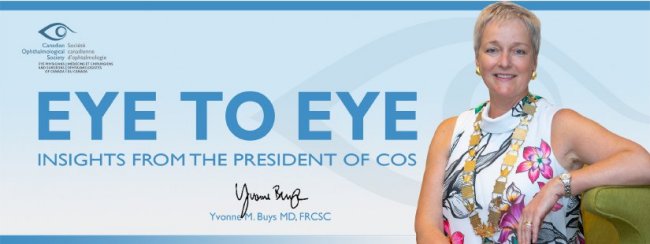
VERSION FRANÇAISE
SPRING 2020Dear Colleagues, As I write this, the COVID-19 virus is impacting all of us - our patients, our staff, our fellow healthcare workers, our families and communities - and the broader economy. We recognize our individual and collective responsibility to decrease the negative impacts of the pandemic. That is why the COS Board made the difficult decision to cancel the physical portion of this year's Annual Meeting scheduled for June 25-28, 2020 in Vancouver, BC. We are working hard to develop an alternative to an in-person meeting and are working with our Session Chairs to create an innovative and educational virtual conference. As details are confirmed, we will keep you up to speed about how we will move forward together and how you may participate. I have also been impressed by the energy and commitment of our members and staff in creating guidance papers and sharing resources for best practice in ophthalmology during COVID-19. I encourage you to visit the COS Practice Resource Centre (PRC, www.cosprc.ca) for COVID-19 resources that have been reviewed and curated for Canadian ophthalmologists. If you have any suggestions or resources that you feel may be of value please share these. In anticipation of our virtual Annual General Meeting, our new Executive Director/CEO, Elisabeth Fowler, and I have been applying the finishing touches to the 2019 COS Annual Report, which will be soon available on the COS website. Please take the time to read it, as I think you will be pleasantly surprised to see just how hard your membership dollars are working for you, your patients and your profession. Elisabeth, who brings her considerable experience to the Executive Director/CEO position, and the entire staff team are working diligently (and remotely) during this unusual time to continue to advance the COS's mission and objectives. In this, my final issue of Eye to Eye as President, I would like to discuss a sample of projects that I feel represent the breadth and depth of our activities and demonstrate the value of COS's strong national unified voice. Balancing evidence and innovation: When CADTH released its report entitled Optimal Use of Minimally Invasive Glaucoma Surgery: A Health Technology Assessment, the key finding was that insufficient evidence existed to make recommendations specific to the optimal use and funding of minimally invasive glaucoma surgery (MIGS). COS recognizes the challenges in bringing innovation to patients and together with the Canadian Glaucoma Society has published a position statement in support of the potential role of MIGS. Drug shortages: COS is actively engaged on the issue of persistent drug shortages and the impact this is having on ophthalmology and our patients. We have met with Health Canada, the Canadian Medical Association, the Provincial/Territorial Drugs Shortages Task Team, and key industry partners. We are in the process of compiling a list of "essential drugs" for ophthalmology (categorized by subspecialty and broken into drugs administered orally and topically) to share with government and industry. COS will continue to send updates to all members regarding specific drug shortages and recalls. Cornea transplantation in Canada: COS is engaged with Canadian Blood Services in the development of a leading practice to enhance cornea transplantation in Canada and address variation between provinces in access to tissue and wait times for corneal surgery. The overarching question framing the work of the collaboration is "Why does Canada not have the best corneal donation and transplantation system where patients can be seen, assessed, booked and transplanted in months as opposed to years?" Under the leadership of Dr. Guillermo Rocha, Chair of the planning committee, and Christine Humphreys, Vice-chair and Director of the Eye Bank of Canada, the work culminated in a two-day national consensus forum in February 2020. An expert guidance document and consensus statements will form the basis of a forum report that will be published in a peer-reviewed journal. This will, in turn, inform a knowledge-translation and policy-impact strategy, as well as a plan for implementation, adoption and evaluation. Reports of glaucoma following anti-VEGF injections: Some ophthalmologists in BC suspect that the rate of glaucoma following anti-VEGF injections in their patients is higher than other jurisdictions and raised this issue with their provincial government injection program. COS has been supporting BC Society of Physicians and Surgeons in requests for an investigation into these allegations and helped support the request for an additional impartial member as an observer on the Provincial Health Services Authority's Joint Accountability Committee. The release of the results of the current retrospective data analysis by the committee will guide subsequent practice changes and ongoing research to help guide best practices in BC and across the country. Advocacy: Advocacy and public awareness continue to remain key strategic priorities for COS. COS asked members to each voluntarily contribute a minimum of $700 to an Advocacy and Public Awareness Fund to support advocacy and public awareness work at a federal level, and to empower the provinces, subspecialty societies and academic community with advocacy tools, training and resources to help raise the profile of the profession. During this time of COVID-19 information overload from so many sources, I believe our membership has benefitted from the leadership of the COS through the creation of guidance documents specific for ophthalmology and I ask every member to please consider making this contribution when you renew - this truly is an example of needing to put our money where our mouths are. Optometry scope of practice: COS was made aware of a didactic training program sponsored by a provincial optometric association to provide "certification" for optometrists to carry out laser procedures as part of the services they offer patients. An optometrist has also requested ER privileges. COS communicated its objections to these activities to the Canadian Association of Optometrists. In addition, COS supported the Eye Physicians and Surgeons of Ontario in their evaluation and mitigation of plans that have surfaced from the School of Optometry at the University of Waterloo to house the lasers and surgery that is currently located in a local hospital. COS continues to monitor the issue of expanded scope of practice as it relates to optometry across Canada and will engage with governments, universities, industry and optometry associations as appropriate. COS Practice Resource Centre and updated website: In May 2019, COS launched the Practice Resource Centre (PRC, www.cosprc.ca) - the "go-to" website for Canadian ophthalmologists to find CPD and practice-related resources. Already this site is exceeding our expectations in terms of traffic and interest and I am grateful to the dedicated individuals on the working group who are guiding the development of content. COS also is working with its web provider to update and refresh the COS public-facing website, as well as the See The Possibilities website, both of which will be launched in 2020. I regret that I won't be able to see you all in Vancouver, but I wish to thank you for the honour of serving as President. It has been my great privilege to work with so many of COS's dedicated members across Canada, the COS staff team, and the many allied organizations that share our vision for patients and our profession. I hand the reins over to my colleague Dr. Colin Mann whom I know will so ably shepherd the COS through next two years. I wish you all good health - please practice safely through this difficult time.
Yvonne M. Buys, MD, FRCSC |
